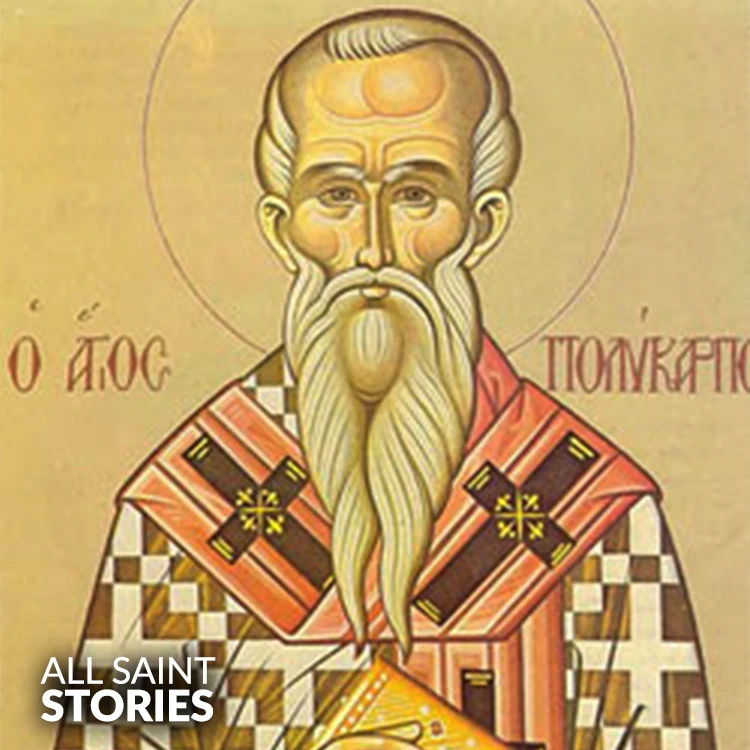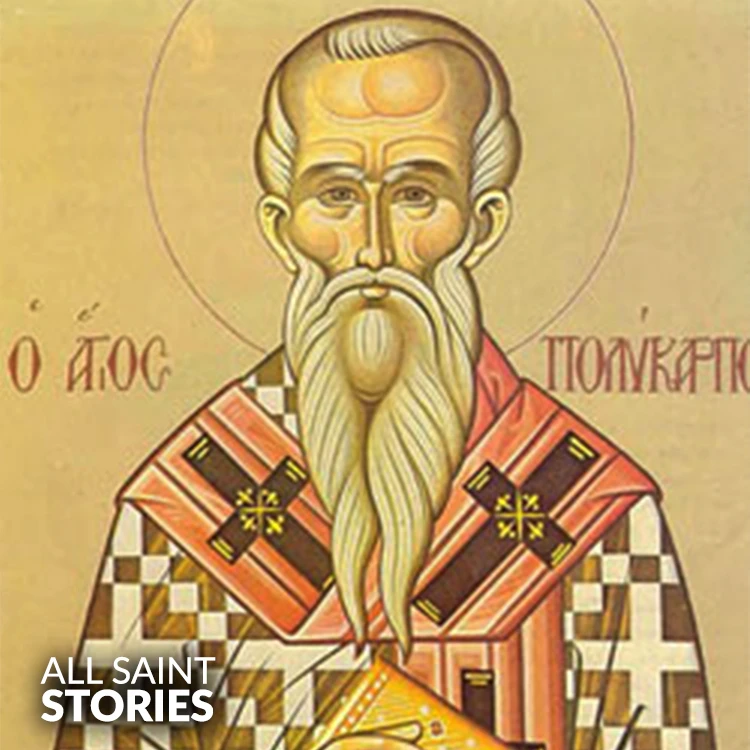"Saint Polycarp, faithful servant of Christ, you endured great trials for the love of God. Intercede for us that we may grow in faith and courage, and remain steadfast in following Christ, even in the face of adversity. Pray for us, that we may be strengthened by the Holy Spirit to live with love and perseverance. Amen."
ST. POLYCARP
ST. POLYCARP

Polycarp of Smyrna, a bishop and martyr, is one of the most significant early Christian saints. He was a disciple of the Apostle John and led the Christian community in Smyrna (modern-day İzmir, Turkey). He was arrested and martyred for his faith during the reign of Roman Emperor Antoninus Pius around 155 AD. Saint Polycarp's steadfast faith and courageous martyrdom left a lasting legacy, and he remains an important figure in early Christian history.
St Polycarp was converted and guided by
St John the Evangelist. At 37, he was consecrated Bishop of Smyrna by St John
shortly before the latter's exile to Patmos. Renowned for his saintly life and
administrative skill, Polycarp faced poverty and persecution by the Jews. At 86
years of age, he traveled to Rome to meet Pope St Anicetus regarding the Easter
date controversy. Despite their disagreement, the Pope allowed Polycarp to
maintain his tradition of celebrating Easter on the 14th day of Nisan, irrespective
of the weekday.
Not long after his return to Smyrna,
fierce persecution of Christians began under Emperor Marcus Aurelius. Polycarp
hid upon the insistence of his followers but was betrayed by a slave under
torture. Brought before the proconsul, he refused to renounce Christ,
declaring, "Eighty-six years have I served Him, and never did He fail me!
How could I now blaspheme my King and Savior? I am a Christian!"
Polycarp was sentenced to be burned
alive. Bound in the stadium at Smyrna, he praised the Trinity and prepared for
martyrdom. Witnesses recount that the flames did not consume him, leaving him
unharmed until he was killed by a spear. His martyrdom (c.155/161-169) was
preserved in detailed accounts, considered one of the earliest records of Christian
martyrdom. St Polycarp is venerated for his bravery and is invoked against
earaches.
Video Not Found
The information on this website is compiled from various trusted sources. While we aim for accuracy, some details may be incomplete or contain discrepancies.
If you notice any errors or have additional information about this saint, please use the form on the left to share your suggestions. Your input helps us improve and maintain reliable content for everyone.
All submissions are reviewed carefully, and your personal details will remain confidential. Thank you for contributing to the accuracy and value of this resource.
Credits & Acknowledgments
- Anudina Visudhar (Malayalam) – Life of Saints for Everyday
by Msgr. Thomas Moothedan, M.A., D.D. - Saint Companions for Each Day
by A. J. M. Mausolfe & J. K. Mausolfe - US Catholic (Faith in Real Life) – Informational articles
- Wikipedia – General reference content and images
- Anastpaul.com – Saint images and reflections
- Pravachaka Sabdam (Malayalam) – Saint-related content and insights
We sincerely thank these authors and platforms for their valuable contributions. If we have unintentionally missed any attribution, please notify us, and we will make the correction promptly.
If you have any suggestion about ST. POLYCARP
Your suggestion will help improve the information about this saint. Your details will not be disclosed anywhere.
© 2026 Copyright @ www.allsaintstories.com












 English
English
 Italian
Italian
 French
French
 Spanish
Spanish
 Malayalam
Malayalam
 Russian
Russian
 Korean
Korean
 Sinhala
Sinhala
 Japanese
Japanese
 Arabic
Arabic
 Portuguese
Portuguese
 Bantu
Bantu
 Greek
Greek
 German
German
 Dutch
Dutch
 Filipino
Filipino